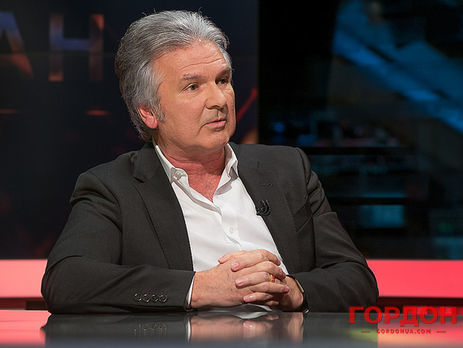On December, 19 2018 the Office of Foreign Assets Control (OFAC) of the US Department of the Treasury notified Congress of its intention to terminate the sanctions imposed on En+ Group plc ("En+"), UC Rusal plc ("Rusal"), and JSC EuroSibEnergo ("ESE") in 30 days. Russian billionaire and aluminum tycoon Oleg Deripaska controls the companies. In order to be delisted the companies have agreed to reduce Deripaska's shareholding stake to less than 50%, to overhaul the composition boards of directors and to undertake significant restructuring.
Deripaska was included in American sanction list on April 6, 2018 among 23 other Russian businessmen and higher officials. In restrictive list also appeared eight entities related to the billionaire, particularly, Rusal ("Русский алюминий") – one of the three largest aluminum producers in the world. In a matter of days after US sanctions announcement, Rusal shares fell to historical minimum and lost 30% of its' value.
Treasury Department's suggestion is very questionable at least because of the fact that the shares would be handed over to Kremlin-controlled organizations and secret service agencies, told GORDON, Yuri Shvets, former KGB officer with Washington D.C. Rezidentura, who emigrated to the USA 25 years ago and now works there as business intelligence analyst.
In Shvets opinion, alleged removal of sanctions against Deripaska's companies will seriously damage the international system for Russia containment. Unfortunately, accented ex-officer, official Kyiv played a part in potential removal by "blurring and weakening" its own sanctions against Rusal. In a manner, it gave Deripaska an opportunity to show Washington that he no longer owns controlling stakes of sanctioned entities. This is far from truth, insists Shvets, especially considering that Kremlin with Deripaska's hands had captured strategic aluminum related industries in Ukraine.
Treasury Department's neat concept is going to fail badly because Deripaska's shares would be simply transferred to two other Kremlin-backed organizations
– US Department of the Treasury notified Congress of its intention to terminate the sanctions imposed on En+ Group and other Deripaska's companies in 30 days in exchange for their restructuring. Does it mean that Trump administration frees one of the closest to Putin oligarchs from sanctions?
– Sanctions against Deripaska and his companies were put into action in April 2018 and were authorized by executive orders 13661 ‘Blocking Property of Additional Persons Contributing to the Situation in Ukraine' and executive order 13662 of the same title. President Barack Obama signed both orders in March 2014 in the wake of Russian aggression towards Ukraine.
It means that Deripaska and his companies were listed for specific reason of being very close to Kremlin and assisting Kremlin in its malicious actions against Ukraine. However, representatives of Deripaska immediately started negotiations with US Department of the Treasury.
– And those negotiations led to…
– …led to what is described in Treasury's letter: Deripaska shall be removed from governing companies, his En+ ownership shall decline to 44.95% from current 70%, remained 25.05% shall be transferred to two other companies, half of En+'s board of directors (6 persons) will be comprised of U.S. or UK nationals.
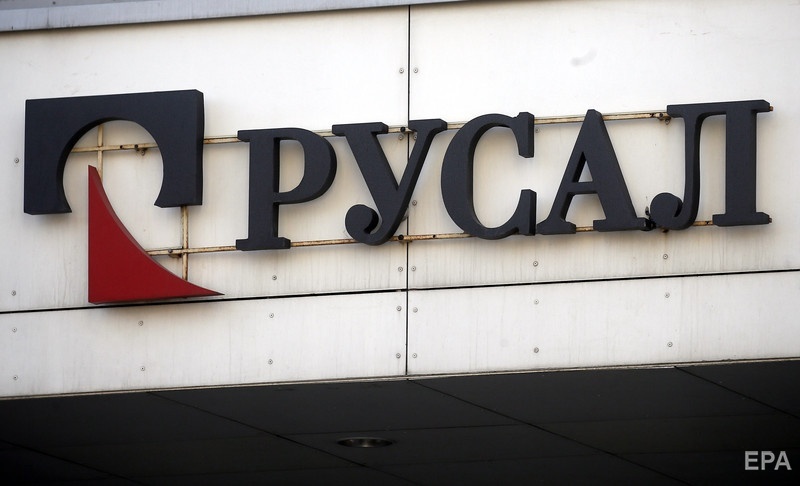 Photo by Maxim Shipenkov / Gordonua.com
Photo by Maxim Shipenkov / Gordonua.com
As a result, according to letter's authors, in all the companies now controlled by Deripaska complete transparency will reign. Kremlin will forfeit control over them and Treasury will be able to supervise closely the compliance with the terms of reached agreement.
– It sounds civilized to me.
– If only there were not "BUT"… Shares taken from Deripaska are going to be handed over to VTB Bank and Glencore Company. And there Treasury Department's neat concept is going to fail badly because VTB Bank and Glencore are completely pocketed by Kremlin, just like Rusal is. It means that approximately 25% of Deripaska's shares would be simply transferred from one to two other Kremlin-backed organizations. By the way, do you know what VTB Bank is?
– Officially, it is Russian state-owned bank; non-officially it is Putin's own bank.
– Exactly! In addition, VTB Bank and its CEO Andrei Kostin are also under American sanctions. The bank was widely exposed in context of Mueller investigation. It was discovered that while already running his presidential campaign Trump signed a letter of intent to build Trump World Tower in Moscow.
Trump aides discussed the plan with Kremlin. Their idea was that Kremlin should appoint an extremely expensive plot of land in Moscow, than it should provide about billion dollars to finance the construction. Keep in mind that it all should have been done at Russian expense, and later on Russians should pay Trump about $300 million for the right to put Trump Tower sign on the building. None other than VTB Bank was supposed to fund the whole scam.
– Remarkable scheme, I am sure on American side many others would agree to join such a lucrative project.
– No, only certain presidential candidates. But it is not all of that. American media reported that in 2016 FBI investigated Kremlin-controlled VTB Bank in connection with suspicious money transfer to the Russian embassy in Washington. Later the bank paid a fine for bogus deals on Chicago Stock Exchange. Total amount of those deals constituted about $36 billion.
And with the help of such a significant bank US Treasury officials are going to make transparent Deripaska's business. If they sincerely believe in what they write it means that their naivety borders with professional incompetence.
Special prosecutor Mueller defined what kind of project Trump attempted to arrange in Moscow. It raises a question: "what did Trump promise in exchange?" I think US Treasury Department's letter on sanctions against Deripaska's companies could be able to help with the answer
– Is it possible that it is not about naivety and incompetence only?
– Consider this logic. At first USA sanctions Deripaska for being close to Putin and financing Kremlin's malicious actions against Ukraine. And now the Office of Foreign Assets Control (OFAC) intents to free his companies from sanctions by shifting shares from one pocket to another ignoring that both pockets are still controlled by Kremlin.
Let me remind that VTB and Glencore who are assigned to get Deripaska's shares had participated in scandalous "privatization" of Rosneft's 19.5% shares. After two years, there is not total clarity over the episode. But it is obvious that it was clandestine operation on behalf of Kremlin, and VTB and Glencore acted as Putin's trusty agents.
This is why statement that transfer of En+ shares from Deripaska to VTB and Glencore would allow to eliminate Kremlin's control over company management is either a flagrant incompetence (I doubt it) or an order from the top level.
– Whose order exactly?
– There are 17 ongoing investigations on Trump and Russian interference in US elections. Special prosecutor Mueller defined what kind of project Trump attempted to arrange in Moscow. It raises a question: "what did Trump promise in exchange?" I think US Treasury Department's letter on sanctions against Deripaska's companies could be able to help with the answer. Mueller should simply issue subpoenas for an interview (the Americans prefer the term over "an interrogation") for the authors of Treasury Department letter and ask them who instructed them to compose all that nonsense.
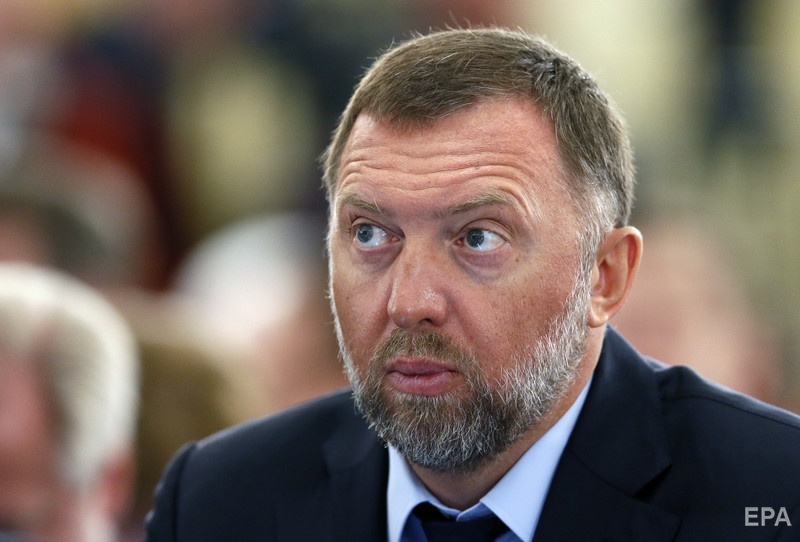 Oleg Deripaska, 50, Russian billionaire and aluminium tycoon. In 2008 he was worth $28 billion. He was once Russia's richest man and was listed ninth in Forbes global billionaires rating. As of January 2018, Forbes estimated his wealth at $7.1 billion and he possessed 247th position. Photo by Yuri Kochetkov / ЕРА
Oleg Deripaska, 50, Russian billionaire and aluminium tycoon. In 2008 he was worth $28 billion. He was once Russia's richest man and was listed ninth in Forbes global billionaires rating. As of January 2018, Forbes estimated his wealth at $7.1 billion and he possessed 247th position. Photo by Yuri Kochetkov / ЕРА
– According to Treasury's plan from now on six persons (i.e. a half) of Deripaska's mother company En+'s board of directors have to be U.S. or UK nationals. Perhaps this would enable transparency and relief from Kremlin's control?
– By no means. In Rusal there are six foreign directors even now. Nevertheless the company is considered to be under Kremlin's control and included in sanctions list.
In Rosneft's board of directors there are seven foreigners and they comprise majority. Among them there are ex-Chancellor of Germany Gerhard Schröder, former Stasi employee Matthias Warnig, BP and TNK-BP ex-CEO Robert Dudley, acting Glencore CEO Ivan Glasenberg. In spite of this Rosneft remains Kremlin's sacred cow and it is absolutely loyal to Kremlin through its loyal directors.
If Department of Treasury does not like Warnig than how Ivan Glasenberg is better? They both work side by side in Rosneft that is under the sanctions too.
– Would you remind who Matthias Warnig is?
– President of Rusal, a former member of the Stasi, one of the most trusted by Putin persons since his tenure in Dresden. It is not completely clear who reported to who: Warnig to Putin or Putin to Warnig. What is clear it is that Warnig has deep Putin's trust and on Putin's behalf supervises the most important business entities? Besides Rosneft and Rusal he seats at executive boards of Transneft, Gazprom, is currently the managing director of the Nord Stream AG and the member of the board of directors at Bank Rossiya – the pocket bank for notorious Ozero cooperative.
It is a sort of an identifying sign: if there is Warnig in company's management than it is Kremlin's company. By the way he is on the supervisory board of VTB Bank, too. All these people who work together at these boards of directors, they all are totally loyal to Kremlin. For this reason this is absurd to try to eliminate Kremlin's influence over En+ by incorporating foreign directors and distributing shares to VTB Bank and Glencore.
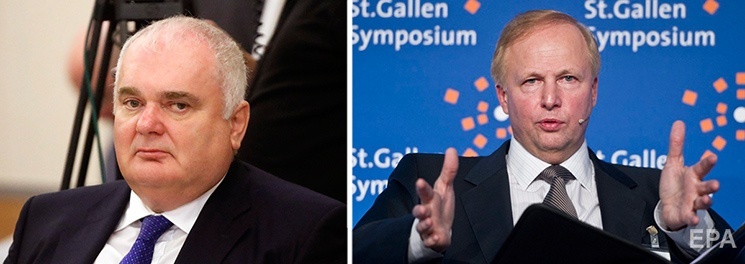 Chairman of the board of directors of Rusal, the managing director of the Nord Stream AG Matthias Warnig and BP president, the member of the board of directors of Rosneft Robert Dudley Photo by Maxim Shemetov, Ennio Leanza / ЕРА
Chairman of the board of directors of Rusal, the managing director of the Nord Stream AG Matthias Warnig and BP president, the member of the board of directors of Rosneft Robert Dudley Photo by Maxim Shemetov, Ennio Leanza / ЕРА
– And who is Robert Dudley?
– He is a good example of how Kremlin makes foreigners loyal and puts them in service. Dudley, US citizen, was CEO at BP (British Petroleum) and then TNK-BP. On that position he evoked Kremlin's discontent by allegedly protecting primarily British interests. At some point of time Dudley felt unwell and sought medical attention. An examination has found a slow-acting poison in his blood.
Terrified businessman swiftly left Russia and Russian party at TNK-BP thrown him out from the company's management. It was in the end of 2008. Time passes. Dudley apparently underwent changes and since 2013 he seats at Rosneft's board of directors where he evidently successfully protects the interest of Kremlin.
– Can you explain these metamorphoses?
– Putin has enormous financial resources for recruiting foreigners and securing their loyalty. When ex-Chancellor of Germany Gerhard Schröder started to work for Putin (no doubt for big money) a new term has even appeared – "Schröderization of the Western elites". Some people are bought, some are intimidated like Dudley. That is why when I read in that OFAC letter that they are going to test and approve candidates for En+ board of directors I feel bewildered.
After the restructuring suggested by Treasury controlling shareholder stack will remain in hands of Kremlin-controlled persons and organozations, and members of the board of the directors including US and UK citizens will be assigned after Kremlin approval only. There should be no illusion about it. En+'s board of the directors will be comprised of people loyal to Putin, bought up within the framework of Schröderization, and any US Treasury Department approval procedure will not be able to prevent it. If Kremlin could manage to impose the original plan on US Treasury Department they will be able to handle the board of the directors without breaking a sweat.
Deripaska is surprisingly little known in Ukraine though it is here where he and his Rusal Company have reached strategic goals important for Kremlin
– I suspect that general audience has only heard about Deripaska in connection with his scandalous relationship with a young woman known under alias Nastya Rybka. At the same time people do not quite understand that there was a reason why Deripaska was allowed to become one of the richest persons in Russia and to control Rusal, one of three largest aluminum producers in the world.
– Deripaska is surprisingly little known in Ukraine though it is here where he and his Rusal Company have reached strategic goals important for Kremlin.
– We are used to consider Gazprom to be the most powerful tool for Kremlin's political and economic pressure on other countries.
– Rusal and Gazprom are almost identical in that respect. In terms of corrupting political and business elites as well as an instrument for Moscow geopolitical influence. Moreover, Kremlin did not use Gazprom and Rosneft for downright spying operations while Rusal is often used as direct tool of Russian secret services.
In order to explain who Deripaska is we should briefly revise the beginning of the 1990's. When the USSR collapsed, one strategic branch of industry was left unsupervised. It was aluminum production. It is of strategic nature because aluminum is essential for construction of airplanes and missiles. As a bonus by holding a grip on aluminum production it is possible to gain control over aerospace industry.
In the middle of 1990's two thirds of Russian aluminum industry was controlled by the Ruben brothers from British TWG who worked in close cooperation with the Cherny brothers. They were investing about $3 billion per year. Unthinkable amount of money for those times. They saved the industry from collapse.
From Kremlin this project was supported by vice-premier-minister Soskovets, FSB chief Barsukov and the head of Eltsin's personal bodyguard service Korzhakov. In 1996 Eltsin sacked all three of them and soon after that old guard from Russian secret service agencies commenced aluminum industry seizure. They discredited the Rubens and the Chernys in the West, created ever growing problems for them inside Russia, and simultaneously they were pushing Deripaska into management of aluminum companies. In 2001 Deripaska married Eltsin's grand-daughter and became "the wallet of the Family".
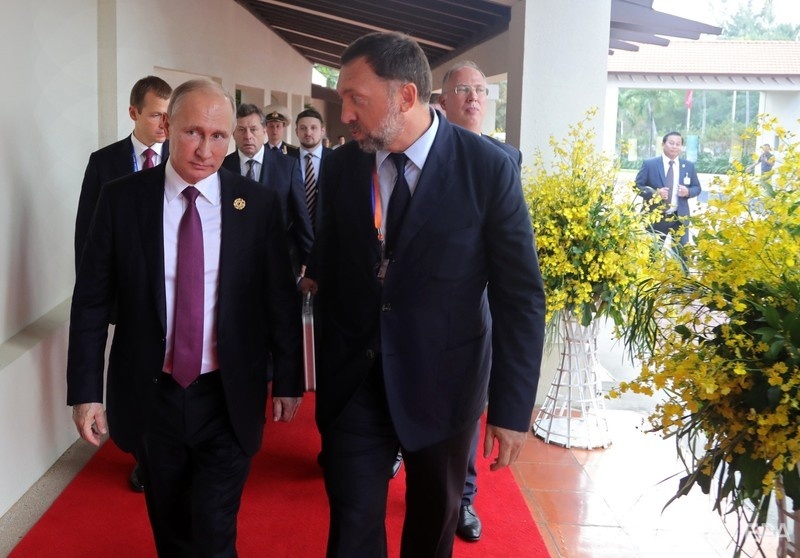 November 2017, Vietnam. Vladimir Putin and Oleg Deripaska during summit of Asia-Pacific Economic Cooperation Photo by Michael Klimentyev / ЕРА
November 2017, Vietnam. Vladimir Putin and Oleg Deripaska during summit of Asia-Pacific Economic Cooperation Photo by Michael Klimentyev / ЕРА
When Putin was made president process of Deripaska's transformation into tycoon was almost completed. It had a price. Deripaska himself admitted that in 2002-2005 he paid total of $170 million in bribes and kick-backs. He witnessed in Western courtrooms that he had paid to two persons from Izmaylovo criminal syndicate about whom he only knew that one was called 'Fatman' and the other one was 'Curly'.
– May be it was simple racketeering, criminal world always tends to "milk" any business.
– It was rough and primitive lie because by that time organized crime in Russia was subdued and controlled by secret service agencies. Izmaylovo syndicate was practically broken down and dispersed. It would be insane to imagine that in a situation like that the holder of billions of the Eltsins family would pay $170 million to some 'Fatman' and 'Curly'.
– In other words?
– $170 million were meant for Putin and his entourage who were still hungry and were hurriedly collecting payments from nouveau riches especially from ones that had received some assistance from special services.
As I have uncovered during my investigations with the beginning of Putin's presidency almost every Deripaska's business operation beyond Russian borders was executed like large Kremlin-backed project. President administration formed a special group led normally by FSB General. He pulled the strings and drew on any needed governmental structure to facilitate the project. In Deripaska's companies worked a lot of people from secret service, formally they were ‘in reserve' but actually they were acting agents with SVR or FSB.
Resources were not spared for that projects. One of them as far as I know was financed in amount of $30 million. It was not gigantic business project by no means but it had certain geopolitical component. Bonuses for those involved in it were significant.
My partner in security business Alexander Litvinenko one or two years prior to his death handed me an information on high-ranked FSB officers who were employed by Deripaska. Among them were General Osadchy, assistant to director of FSB, head of URPO FSB General Hoholkov, General Lutsenko, ex-FSB top officer who had later headed private security firm "STELS", chief of FSB own security department General Pronin, General Oleynikov, first deputy minister of security Barannikova.
Just think of it: an American businessman Mark Rich in the middle of the Cold War actively cooperates with Soviet Union circumventing international sanctions. It could not be possible without KGB
– So, US Departmet of Treasury suggests that management of Deripaska's companies should be shift to two Kremlin-controlled entities — VTB Bank and Glencore. We have already discussed VTB. What does Glencore appear to be? Why it is considered to be close to Kremlin?
– Glencore is Swiss-based commodity trader, one of the three founders of Rusal. In addition, until April 2018 for more than 11 years Glencore's CEO Ivan Glasenberg had been the member of the board of the directors at Rusal. This is why as a founder and a manager of Rusal Glencore should be responsible for Deripaska's versatile activities.
American businessman Mark Rich founded Glencore in 1970s. If there were a rating for the most prominent frauds of twenties century he would be at the top of it. Rich made a fortune on evading UN sanctions against different countries. He popped up in the USSR in late 70's or early 80's when Soviet Union was sanctioned for Afganistan and South Korean Boeing attack.
Sanctions hit Soviet economy very hard, it was agonizing. Many people don't remember that so well buy the USSR was not able to feed itself and on regular basis purchased large quantities of grains abroad mainly in the USA and Canada. It was Mark Rich's Glencore job to deliver grains bypassing the sanctions. He also traded Soviet oil, aluminum and copper. Obviously, this line of work could not go on without heavy KGB involvement. Just think of it: an American in the middle of the Cold War actively cooperates with Soviet Union circumventing international sanctions. It could not be possible without KGB.
 Founder of Glencore, American entrepreneur Mark Rich. Photo by Urs Flueeler / ЕРА
Founder of Glencore, American entrepreneur Mark Rich. Photo by Urs Flueeler / ЕРА
Rich also did Russian official a big favor by teaching them how to run complicated fraudulent schemes. How to evade sanctions, how to gain personally while managing state-owned enterprises, how to mask origin of goods, how to organize double bookkeeping and so on. It was valuable know-how on the basis of which mafia state has bloomed in Russia especially under Putin's rule.
Following Soviet Union demise Mark Rich's office in Moscow was planted with numerous secret service officers. Mostly they were previously working in Minister of Trade and Ministry of Foreign Affairs, usual covers for intelligence operatives. In 1993 top managers drove Rich out of the company and Ivan Glasenberg took over CEO position.
It was the same person who founded Rusal together with Deripaska, who sits in board of directors at Rosneft, beloved Kremlin's creature, accompanied there by Gerhard Schröder, Igor Sechin, Matthias Warnig – Putin's most trusted allies. And it is with his help Treasury plans to make Deripaska's companies more transparent. They should at least visit Glencore's web-site and look for meaningful information on company's operations in Russia!
– There is none.
– Practically, none. Glencore is one of the most non-transparent companies in the world. It is odd that Treasury Department is not aware about it.
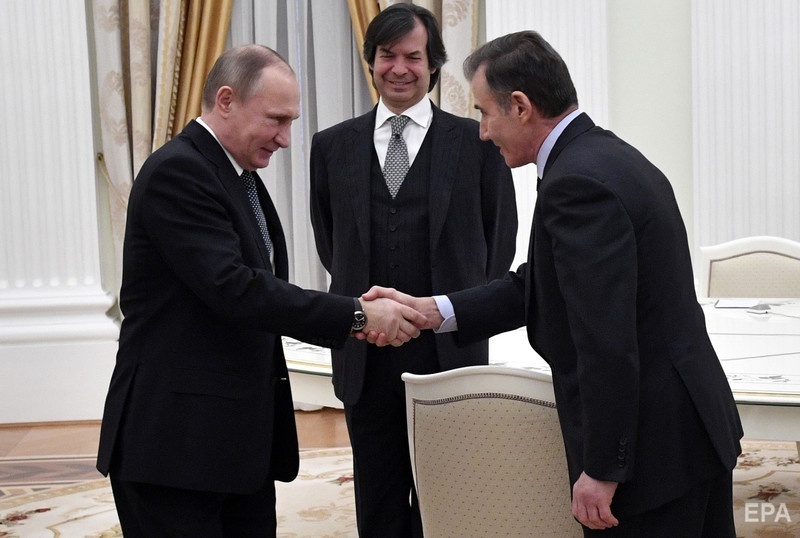 January 2017, Moscow. President of RF Vladimir Putin shakes hands with Glencore CEO Ivan Glasenberg during a meeting on Rosneft privatization in Kremlin. Photo by Alexander Nemenov / ЕРА
January 2017, Moscow. President of RF Vladimir Putin shakes hands with Glencore CEO Ivan Glasenberg during a meeting on Rosneft privatization in Kremlin. Photo by Alexander Nemenov / ЕРА
War with Russia lasts for the fifth year and Putin's wallet Deripaska still controls strategic Ukrainian objects
– Let's move on to a painful for me part of the conversation. You have mentioned that Deripaska and his Rusal is a powerful tool to corrupt authorities in different countries including Ukraine. Who or what exactly do you mean by that?
– It is a painful topis for me as well. Ukrainian elite has found themselves in an unpleasant situation with Rusal. And not only inside the country but in respect of relationship with the USA mostly. In Ukraine a word "zrada" is so popular that it has almost ironic connotation. ("Zrada" is Ukranian for "betrayal", is widely used as a part of antipode pair "zrada – peremoga" means "betrayal – victory") But in the particular case of Rusal obvious unwillingness of the Ukrainian authorities to implement real sanctions against it is nothing but zrada, betrayal of national interests.
– Wait a moment. How do you mean "unwillingness of the Ukrainian authorities to implement real sanctions" if Deripaska is listed in the Ukrainian sanctions list in May 2018? NSDC has forbidden him for three years to withdraw capital and blocked his assets.
– To begin with the fact that Rusal brilliantly realized Kremlin's plan and captured two strategic industries in Ukraine crucial for the national security. Namely aluminum production and through it – aerospace industry.
– When did it happen?
– In February 2000 30% of shares of Mykolayiv Alumina Plant were given to Rusal. It was an interesting episode. Then resident of Ukraine appointed to secure the deal the politician whose father was the chairman of SBU. He arranged everything nice and quiet. As result president's son-in-law has got the shares packet and almost immediately sold it back for $50 million to Deripaska. In the course of following years another 25% of shares were sold to Deripaska.
Deripaska also acquired Kharkiv Tractor Plant (another important strategic object for it produces heavy armored vehicles) and in 2007 Zaporozhye aluminium combine as a matter of fact cut it to pieces for scrap-metal. In August 2017 SBU initiated criminal proceedings in which Deripaska was charged as a participant of criminal organization that demolish the plant in Russian interests. More than that he was suspected of direct sabotage since by destroying the enterprise he did not only eliminate competitors but reduce economic potential of Ukraine on Russia's behalf. But as far as I know the proceedings were put on hold and laid aside.
Mykolayiv Alumina Plant has become a pearl of Deripaska Aluminum Empire. If he would be deprived of control over the plant as well as over nearby Dnieper–Bug port through which raw materials are delivered, it would be a powerful strike at Deripaska's business empire or to be more precise at Kremlin and the whole Russian aluminum industry.
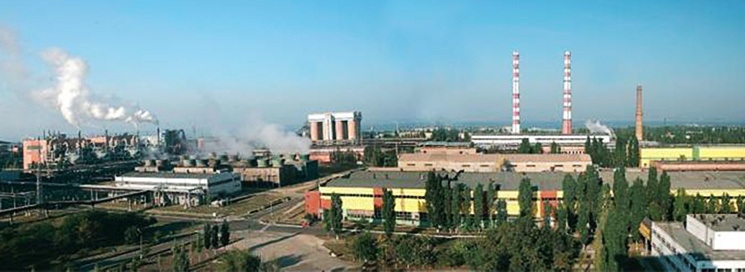 Mykolayiv Alumina Plant is the largest in Ukraine and one of the largest in Europe producer of non-ferrous metallurgy. Built in 1980. In 2017 acquired by Glencore Company. Photo by uk.wikipedia.org
Mykolayiv Alumina Plant is the largest in Ukraine and one of the largest in Europe producer of non-ferrous metallurgy. Built in 1980. In 2017 acquired by Glencore Company. Photo by uk.wikipedia.org
OK, before Russian aggression in 2014 dealing with Deripaska could be explained by negligence of Ukrainian officials densely mixed with corruption. But now, war with Russia lasts for the fifth year and Putin's wallet Deripaska still controls strategic Ukrainian objects. And yet he is allegedly under some sanctions…
– But why "allegedly' if he is on the NSDC sanctions list?
– Firstly, those sanctions were imposed only on the fourth year after aggression started. Why wait so long? Didn't anyone in Ukraine suspect that Deripaska is Putin's guy?
Secondly, initial package of Ukrainian sanctions stipulated in NSDC decision of April 28, 2017 was harsh enough indeed. Deripaska was prohibited from almost any business activity including transmitting assets. But in October 2017 Rusal announced transfer of ownership of Mykolayiv Alumina Plant to Glencore. And despite NSDC's direct ban Antimonopoly Committee of Ukraine approved the deal.
Such a kindness of the committee allowed Rusal and Glencore to conduct basically fraudulent operation with intention to evade American sanctions by fictitious assets deal. It was fictitious and we know it because in April 2018 when Americans sanctioned Rusal and Glencore in panic left the deal with Deripaska it occurred that Mykolayiv Alumina Plant transfer never happened.
It may look like the perfect moment to grill company from aggressive country for bluffs and lies but NSDC on contrary came to help and in its new decision of May 2, 2018 there were only two restrictive measures instead of eight. And what was more important the ban on transferring assets was repealed.
– Why it was done this way?
– I reckon it was done to give an opportunity for Deripaska's lobbyists to fool Treasury Department that eventually led to that crazy plan to remove sanctions against Rusal by transferring assets from one Kremlin-backed structure to the others. In other words some Ukrainian authorities effectively worked along with Deripaska's lobbyists to get Kremlin-controlled Rusal out from under US sanctions.
By the way, while Deripaska and his lobbyists keep fooling US government trying to secure sanctions removal it appeared that Rusal is amongst the favorites of Ukrainian top officials.
– Why is that?
– It's very simple. As you know in Ukraine enterprises firstly pay VAT and then government pays it back retrospectively. And since the start of aggression in certain months Mykolayiv Alumina Plant was among the top ten companies that received VAT reimbursement faster than others and in cash. In 2013 before the Russian aggression the plant possessed 21-th place with total VAT reimbursement of 0.4 million UAH. When aggression started volume of reimbursement soared to approximately 1 billion UAH per year. As the saying goes: some die at war, and some make profit of it.
Further on under the Ukrainian law foreign corporations have no right to own sea ports. But in the end of 2015 Deripaska and Rusal received certain privileges in Ukraine and factually acquired Dniepro-Bug port. I'd like to ask again: why? For what merits?
Rusal delivered special equipment to Ukraine, it was used to spy on US embassy employees and US diplomats while they were in Kyiv
– You mentioned that Kremlin uses Rusal for spying activities. What exactly do you mean by it?
– Euromaidan events of 2013-2014 triggered aggravation of cyberwar. Ruassian hackers attacked objects in Ukraine. In retaliation Ukrainian hackers and opposition hackers group from RF attacked governmental departments in Moscow. The Christian Science Monitor reported on March 18, 2014 that under attack have been Ministry of Defense, Central bank, Ministry of Foreign Affairs and other Russian governmental offices. And at that the media marked that Ukrainian cyber-attacks were much harsher then Russian ones.
It was discovered that among targets of the attack there were Rusal, Gazprom, Sukhoi Company and Chinese embassy in Moscow. A hackers group called hacktivist@rucyborg claimed responsibility for the attack by making announcement on several hacking sites. In the train of the attack significant quantity of documents were captured (about 3 thousand files), many of them were released to the public. These documents attracted attention of international analytic centers. In particular the group was mentioned in a research made in University of Reading that is a part of Oxford University and 98% of its researches are recognized worldwide.
After the hacking a document was published that was sent by Trading Board of China to several Russian Federation high ranked representatives. In particular among receivers was Rostec Corporation CEO and one of the oldest Putin's allies Sergey Chemezov.
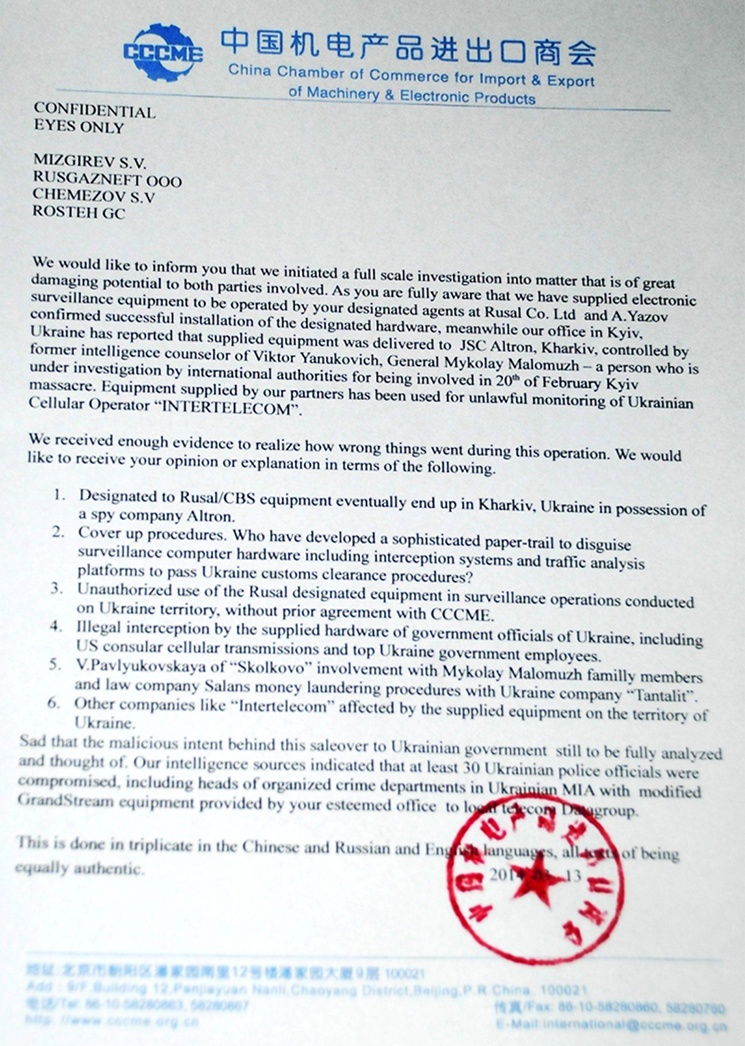 "After the hacking a document was published that was sent by Trading Board of China to several Russian Federation high ranked representatives. In particular among receivers was Rostec Corporation CEO and one of the oldest Putin's allies Sergey Chemezov"
"After the hacking a document was published that was sent by Trading Board of China to several Russian Federation high ranked representatives. In particular among receivers was Rostec Corporation CEO and one of the oldest Putin's allies Sergey Chemezov"
The document describes how in the midst of Euromaidan events Rusal clandestinely delivered to Kharkiv equipment for mobile traffic interception in violation of laws and agreements. Then as hacktivists announcement stated the same equipment was used by Rusal partners for unlawful interception of traffic of Ukrtelecom, Ukrainian telecommunications operator. Also in the same message top managers of Rusal were described as 'Kremlin's puppets'.
The equipment mentioned above was later used to intercept telephone conversations of US embassy employees in Kyiv as well as conversations of US top officials visiting Ukraine.
– I remember that in early February 2014 someone uploaded to internet audio file of telephone conversation between Victoria Nuland and then US Ambassador in Kyiv Geoffrey Pyatt.
– Exactly. Now we know who and how had this conversation recorded. It seems obvious that record was made by Russians or their agents because the fragments made public were meant to make the USA and its diplomats look bad.
It was unclear in 2014 who made it but the Chinese document sheds some light on the situation. Specifically: Rusal delivered special equipment to Ukraine, it was used to spy on US embassy employees and US diplomats while they were in Kyiv.
To tell you more, after Yanukovich had flee it was discovered that under his presidency the entire computer network of SBU was put under FSB control. In the famous SBU building on Volodymyrska Street there was a compartment where the Russians worked on their own equipment and SBU officers were not let in it. Now it is possible to discover what that equipment was and whether Rusal was involved in its purchase.
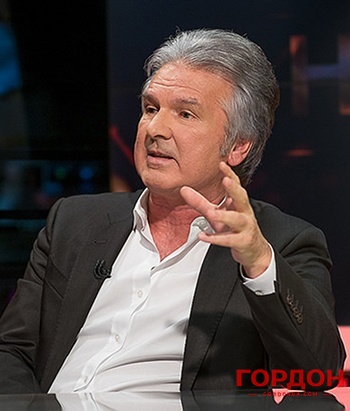 Shvets: "Ukrainian elite has found themselves in an unpleasant situation with Rusal. And not only inside the country but in respect of relationship with the USA mostly". Photo by Sergey Krylatov / Gordonua.com
Shvets: "Ukrainian elite has found themselves in an unpleasant situation with Rusal. And not only inside the country but in respect of relationship with the USA mostly". Photo by Sergey Krylatov / Gordonua.com– Do you believe in the story about spying equipment?
– This is not a question of faith. Intel data should be checked, double checked and triple checked. But there are too many saw puzzle pieces present. And they make a clear image. There was hacker attack. It was spotted by respected international analysts. Hackers group did claim responsibility for Chinese embassy hacking and directly described the mentioned document.
There was an interception of mobile conversation between US Ambassador and Assistant Secretary of State Victoria Nuland. And in general authenticity of documents obtained by hacking very seldom do raise doubts. WikiLeaks, for example, releases almost exclusively the data obtained by hackers and no one challenges this content's authenticity.
And finally, on December 1, 2011 WikiLeaks started to publish information within the framework of Spy Files project in order to uncover global industry of surveillance and shadowing. On their site there is information on Altron Company which, according to the Chinese document, sold to Rusal special equipment for mobile traffic interception.
– Let's summarize our conversation.
– With pleasure. Before January 19, 2019 Congress should consider US Department of Treasury plan to repeale sanctions against Deripaska's companies. If the plan would be approved and executed than Rusal would remain an effective tool in Kremlin's hands for pursuing its political goals. Moreover, Rusal's public image would be completely purified by American authorities. It would be an act of such sheer recklessness that it would question an ability of the acting Administration to make rational decisions on even simple matters. I sincerely hope that Congress will not allow it to happen.
With regard to Ukraine there is even more gruesome conclusion. After five years of war official Kyiv did not even impose real sanctions against Deripaska and his Ukrainian assets. But on the contrary it did help Russian oligarch and his corporations to evade American sanctions through a scheme of fictitious assets transfer. So, some die at war, and for some it is nothing personal, just business.


 -7 Kyiv
-7 Kyiv
